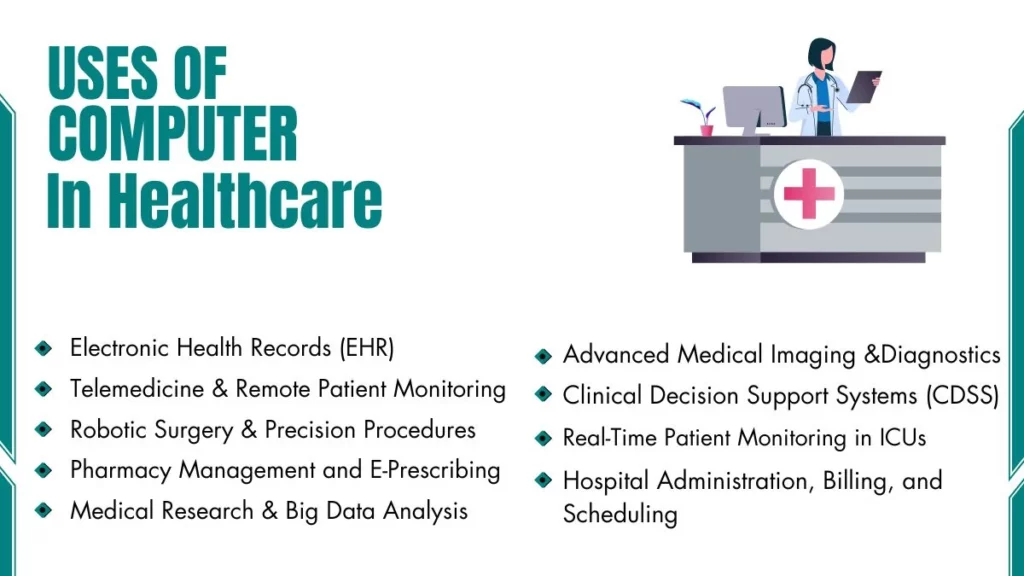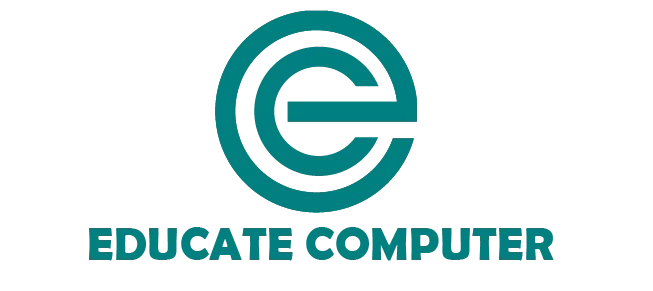Uses of computers in healthcare help in lifesaving tools that support doctors, save patients, and guide medical research. From diagnosis to surgery and from data storage to telemedicine, every part of healthcare depends on technology. Let’s discuss the uses of computers in healthcare in more detail.
Uses of Computers in Healthcare Field
Here are common uses of computer in healthcare:
1. Electronic Health Records (EHR) and Patient Data Management
One of the most common uses of computers in healthcare field is the creation and management of Electronic Health Records (EHRs). Instead of depending on physical files, hospitals now store patient information digitally. These records contain medical history, test results, allergies, and treatment plans, all in one place.
Doctors can quickly retrieve information without wasting time searching through paper files with EHRs. These records are also shared between hospitals. This process is called interoperability. This means a patient can visit a new hospital, and the doctors there can still access their records safely.
2. Advanced Medical Imaging and Diagnostics
Medical imaging is another area where computers play an important role. Machines like CT scanners, MRI systems, and ultrasound devices are powered and controlled by computers. These machines create detailed images of the human body. This helps doctors see what is happening inside without surgery.
For example, a CT scan combines several X-ray images to create a 3D view of organs and tissues. An MRI scan uses magnetic fields and computer algorithms to generate high-resolution pictures, which are very useful for detecting brain or muscle disorders.
3. Telemedicine and Remote Patient Monitoring (RPM)
Telemedicine is one of the fastest-growing applications of computers in healthcare. It allows doctors to consult with patients through video calls and online platforms. This system is especially helpful for people who live in rural or remote areas where hospitals are far away.
Remote Patient Monitoring (RPM) takes this further by using wearable devices like smartwatches or patches. These devices collect health data such as heartbeat, blood pressure, or glucose levels and send it directly to doctors. This way, patients do not always need to visit hospitals, and doctors can still keep track of their health in real time.
4. Clinical Decision Support Systems (CDSS)
Clinical Decision Support Systems are computer-based tools that help healthcare professionals make better medical decisions. These systems provide real-time alerts, reminders, and suggestions that support doctors in their work.
For example, CDSS can warn doctors about possible drug interactions if two medicines are prescribed together. They can also remind hospitals about overdue checkups, vaccinations, or screenings. Another advantage is that these systems give doctors quick access to the latest medical research and evidence-based guidelines.
5. Robotic Surgery and Precision Procedures
Modern surgeries often use computer-controlled robotic systems. One famous example is the Da Vinci Surgical System, which allows surgeons to perform highly precise operations with the help of robotic arms. These arms move with extreme stability and accuracy.
Robotic surgery is especially useful for delicate procedures where even the smallest mistake can be dangerous. The surgeon controls the robot through a console, while the system provides magnified 3D views of the body.
6. Artificial Intelligence (AI) and Machine Learning
Artificial Intelligence and Machine Learning are transforming healthcare in ways that were not possible before. These advanced computer systems can analyze huge amounts of medical data within seconds and find patterns that humans might miss.
AI is now used in diagnosis, where it scans X-rays, CT scans, or mammograms to detect early signs of disease. Machine learning is also making drug discovery faster by simulating how different molecules interact in the human body.
7. Pharmacy Management and E-Prescribing
Pharmacies rely heavily on computers to manage medicines and prescriptions. Instead of writing paper prescriptions, doctors now use e-prescribing systems to send prescriptions directly to pharmacies. This reduces mistakes caused by handwriting errors and makes the process faster for patients.
Computers also help manage large inventories of medicines. They track stock in real time and ensure that essential drugs are always available. In addition, pharmacy software can calculate correct doses for patients, which reduces the risk of overdose or underdose.
8. Real-Time Patient Monitoring in Wards and ICUs
In hospital wards and ICU computers are used to monitor patients around the clock. Machines connected to patients measure vital signs like heart rate, oxygen levels, and blood pressure, and the data is displayed on computer screens in real time.
If there is a sudden change in a patient’s condition, the system raises an alarm to alert doctors and nurses immediately. This early warning can save lives in critical situations. Computers also record patient data continuously. It creates detailed charts and trends that help doctors study progress and adjust treatments accordingly.
9. Medical Research and Big Data Analysis
Computers are essential for modern medical research because they can handle extremely large datasets. In fields like genomics, researchers use powerful computers to analyze DNA sequences and design personalized treatments based on genetic information.
Big data analysis is also used in clinical trials, where millions of data points are processed to check the safety and effectiveness of new medicines. At the population level, computers track disease outbreaks, study vaccination results, and model public health trends.
10. Hospital Administration, Billing, and Scheduling
Hospitals are complex organizations that need strong management systems. Computers are used for administration tasks such as scheduling appointments, managing staff shifts, and keeping track of bed availability.
In billing, computers process patient payments, insurance claims, and financial records. This reduces fraud and makes the payment process smoother. Supply chain management is another area where computers play a role. Hospitals use them to monitor medical equipment, surgical tools, and protective gear. This ensures nothing runs out during emergencies.


